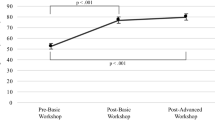Abstract
Introduction
Effective behavior change counseling is an important component of the optimal care of patients, yet only a minority of medical schools currently include such training in their curriculum.
Aim
To design and evaluate a formal curriculum to teach medical students the principles of motivational interviewing (MI) that will improve knowledge, skills, and confidence in the area of counseling patients for health behavior change.
Participants
Fifty-three 3rd year medical students at the University of California, San Diego.
Program Description
A 4-week curriculum consisting of four 2-h sessions, in a small group format (8–12 students). Educational strategies included a combination of short didactics, video demonstrations, small group role plays, and interactive exercises.
Program Evaluation
Students completed identical pre- and post-assessments, consisting of a questionnaire measuring confidence and knowledge, and a performance assessment using the Video Assessment of Simulated Encounters-Revised (VASE-R) tool. Knowledge improved significantly (pre-mean: 7.04, post-mean: 11.54; P < 0.001), as did skill development (pre-mean: 7.02, post-mean: 9.47; P < 0.001). Student satisfaction with behavior change counseling training improved from 3.6 to 8.1 (P < 0.001). Students were significantly more confident (P < 0.001) in their abilities to assess a patient’s readiness for change and counsel the patient on behavior change after the course.
Discussion
Participation in a focused curriculum on the use of motivational interviewing techniques significantly improved 3rd year medical students’ knowledge, confidence, and skills in the area of behavior change counseling. These gains may help students succeed in promoting good health habits in their future patients.
Similar content being viewed by others
References
Emmons K, Rollnick S. Motivational interviewing in health care settings. Am J Prev Med. 2001;20(1):68–74.
Maguire P, Pitceathly C. Key communication skills and how to acquire them. Br Med J. 2002;325:697–700.
Learning objectives for medical student education—guidelines for medical schools: report III of the Medical School Objectives Project. http://www.aamc.org/meded/msop/msop3.pdf. Accessed May 2, 2008.
Arthur D. Assessing nursing students’ basic communication and interviewing skills: the development and testing of a rating scale. J Adv Nurs. 1999;29(3):658–65.
Poirier MK, Clark MM, Cerhan JH, Pruthi S, Geda Y, Dale L. Teaching motivational interviewing to first-year medical students to improve counseling skills in health behavior change. Mayo Clin Proc. 2004;79:327–31.
Brown RL, Pfeifer JM, Gjerde CL, Seibert CS, Haq CL. Teaching patient-centered tobacco intervention to first-year medical students. J Gen Intern Med. 2004;19:535–9.
US Preventive Services Task Force. Guide to clinical preventive services, second edition. Available at: http://www.odphp.osophs.dhhs.gov/pubs/guidecps/ . Accessed May 2, 2008.
Miller WR, Rollnick SR. Motivational interviewing: preparing people to change behavior. New York: The Guilford Press; 1991.
Brodie DA. Motivational interviewing to promote physical activity for people with chronic heart failure. J Adv Nurs. 2005;50(5):518–27.
Secades-Villa R, Fernande-Hermida JR, Arnaez-Montaraz C. Motivational interviewing and treatment retention among drug user patients: a pilot study. Subst Use Misue. 2004;39(9):1369–78.
Schmaling KB, Blume AW, Afari N. A randomized controlled pilot study of motivational interviewing to change attitudes about adherence to medications for asthma. J Clin Psychol Med Settings. 2001;8(3):167–72.
Rosengren DB, Baer JS, Hartzler B, Dunn CW, Wells EA. The video assessment of simulated encounters (VASE): development and validation of a group-administered method of evaluating clinician skills in motivational interviewing. Drug Alcohol Depend. 2005;79:321–330.
Green ML, Gross CP, Kernan WN, Wong JG, Holmboe ES. Integrating teaching skills and clinical content in a faculty development workshop. J Gen Intern Med. 2003;18:468–74.
Yedidia MJ, Gillespie CC, Kachur E, Schwartz MD, Ockene J, Chepaitis AE, Snyder CW, Lazare A, Lipkin M Jr. Effect of communications training on medical student performance. JAMA. 2003;290(9):1157–65.
Acknowledgements
We would like to give a very special acknowledgement to Ted Canterbury, co-facilitator of the course, who is instrumental in the success of the program. A portion of this work was presented at the regional SGIM conference in San Francisco, 24 March 2007. No funding support was received for this study.
Conflict of Interest
None disclosed.
Author information
Authors and Affiliations
Corresponding author
Rights and permissions
About this article
Cite this article
Bell, K., Cole, B.A. Improving Medical Students’ Success in Promoting Health Behavior Change: A Curriculum Evaluation. J GEN INTERN MED 23, 1503–1506 (2008). https://doi.org/10.1007/s11606-008-0678-x
Received:
Revised:
Accepted:
Published:
Issue Date:
DOI: https://doi.org/10.1007/s11606-008-0678-x




